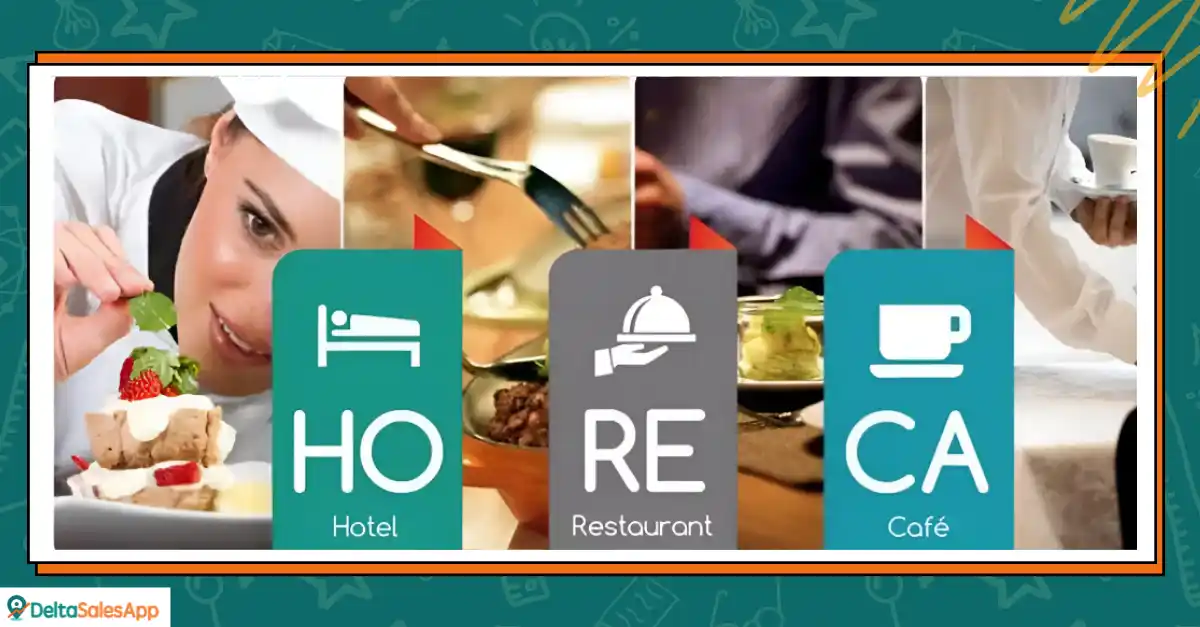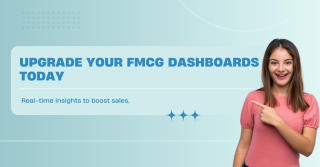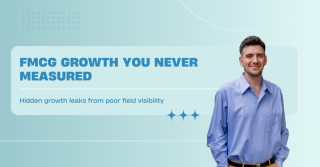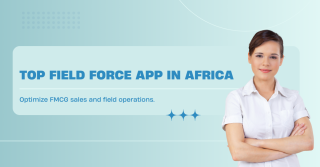What is HoReCa and Why it’s Crucial for FMCG Brands?

The HoReCa (Hotel, Restaurant, and Café) market plays a crucial role in the global economy, with a market value of USD 3,574.5 billion in 2024. It is projected to grow significantly, reaching USD 6,449.35 billion by 2032, reflecting a substantial growth potential. This market is expected to expand at a compound annual growth rate (CAGR) of 6.70% from 2024 to 2032.
A key segment within the HoReCa sector is the beverage market, which is an essential component of the overall industry. Several factors influence the growth of the HoReCa market, such as the increasing demand for processed foods and the expansion of food establishments globally. Major brands and companies are prominent players in this market, contributing to its development. In the European Union, the HoReCa sector holds significant economic value, supporting numerous enterprises and jobs, while also playing a crucial role in the value added to the economy.
For FMCG (Fast-Moving Consumer Goods) companies, these figures highlight a clear opportunity: HoReCa is not just another sales channel, but a dynamic space for growth, customer loyalty, and long-term success. Leading global companies are already capitalizing on this potential by tailoring their offerings to meet the unique demands of this influential sector.
But what exactly does HoReCa mean? Why is it becoming a top priority for FMCG brands globally?
In this article, we’ll cover them all!
Let's get started!
What is HoReCa?
HoReCa is an acronym that stands for Hotels, Restaurants, and Cafés/Catering — three vital segments that together form the backbone of the global hospitality and foodservice industries.
These businesses are dedicated to offering a range of services focused on delivering food, beverages, and accommodation experiences to consumers across a wide variety of settings, from luxury hotels to casual neighborhood cafés.
The HoReCa sector plays a pivotal role in influencing consumer lifestyles, dining trends, travel experiences, and even local economies.
For FMCG brands, HoReCa presents a unique and lucrative channel to reach large volumes of end-consumers indirectly, by supplying products that are consumed or used within these establishments.
To understand HoReCa’s full scope, let's explore each segment individually:
Hotels
Hotels serve a wide audience, ranging from solo business travelers and tourists to families and event attendees.
FMCG brands cater to hotels by supplying:
-
In-room amenities like toiletries (shampoo, soap, lotions)
-
Mini-bar snacks and beverages
-
Bottled water and premium drinks
-
Breakfast cereals, coffee pods, and other pantry items
Hotels typically demand bulk quantities, consistent supply chains, custom branding options, and high quality assurance.
Restaurants
Restaurants, from quick-service outlets to Michelin-starred fine dining establishments, source a vast array of FMCG products, including:
-
Cooking essentials (spices, oils, sauces)
-
Packaged convenience foods
-
Fresh and specialty beverages
The key requirement here is consistent quality, punctual deliveries, and support for culinary innovation.
Cafés and Catering Services
Cafés have become social staples, offering spaces where people gather over coffee, pastries, and light meals.
They rely on FMCG brands for:
-
Coffee beans, tea leaves, and brewing essentials
-
Dairy products like milk, cream, and cheese
-
Fresh bakery goods and desserts
Catering companies, meanwhile, need versatile supplies for:
-
Weddings, corporate events, private parties, and festivals
-
On-site and off-site food setups
Reliability, flexibility, and rapid fulfillment are key expectations in this segment.
Key Challenges FMCG Brands Encounter in the HoReCa Sector
Despite its size and potential, the HoReCa market presents several hurdles for FMCG brands:
1. Ineffective Lead Generation and Onboarding
Identifying the right HoReCa partners is challenging without detailed customer profiling.
Without clarity on parameters like location, cuisine type, purchase capacity, and service model, brands risk chasing unsuitable leads.
Example:
Pitching gourmet Italian cheeses to a fast-food burger chain? That’s a mismatch that wastes valuable time and resources.
Common problems include:
-
Poor tracking of prospects
-
Delays in lead nurturing and demos
-
Low conversion rates due to misaligned targeting
-
Friction during onboarding due to paperwork and manual processes
2. Weak Relationship Management Post-Onboarding
Signing a contract doesn’t guarantee loyalty. Without a proactive relationship management strategy, brands often lose out.
Common pitfalls include:
-
Information between sales and service teams
-
Missed upsell or cross-sell opportunities
-
Poor complaint resolution mechanisms
Field reps juggling spreadsheets, emails, and disconnected CRM systems often deliver inconsistent service, which damages customer trust.
3. Disorganized Field Visits
In the HoReCa industry, personal interactions still play a critical role in maintaining partnerships.
However, when field visits are not well-planned:
-
Visits are sporadic or skipped
-
Opportunities for engagement and feedback are missed
-
Reports are incomplete, leading to poor insights
Without structured planning, field sales operations lose effectiveness, putting customer relationships at risk.
4. Manual and Inefficient Order Processes
Many establishments still place their orders via phone calls, handwritten lists, or even informal WhatsApp messages.
This outdated system leads to:
-
Frequent order errors
-
Forgotten promotional schemes
-
Poor tracking of delivery schedules
In industries dealing with perishable goods, such delays and mistakes can be costly, both in lost sales and in damaged relationships.
5. Inadequate Product and Promotion Communication
Without digital communication tools, informing customers about new products, pricing changes, or promotions becomes slow and inconsistent.
Consequences include:
-
Low awareness of new product launches
-
Reduced participation in promotions
-
Slower revenue growth
Relying solely on sales reps to carry updates manually is not only inefficient but also unsustainable as portfolios expand.
Solutions to Succeed in the HoReCa Sector
Winning in the HoReCa channel requires more than just a great product — it demands efficiency, visibility, and customer-centric processes at every step.
To overcome the challenges discussed earlier, FMCG brands must embrace modern technologies and reimagine their sales operations.
Here’s a deeper look at the key solutions:
1. Digitize Lead Management and Customer Onboarding
Traditional lead generation methods often rely on manual processes, scattered notes, or inconsistent qualification criteria.
To maximize efficiency and conversions, FMCG brands must digitize lead management and create structured onboarding workflows.
Smart field sales applications help automate and streamline the entire process, from prospect identification to final customer activation.
Key benefits include:
-
Automated customer profiling based on parameters like cuisine type, purchase volume, and service preferences
-
Intelligent lead assignment to the best-suited sales representatives based on territory, experience, or specialization
-
Real-time tracking of every interaction, call, demo, and negotiation stage
-
Digital onboarding tools such as e-contracts, digital forms, and onboarding checklists that save time and reduce errors
By adopting structured digital workflows, brands can accelerate conversion cycles, improve targeting accuracy, and ensure that every new customer receives a consistent, professional onboarding experience.
2. Implement an Integrated CRM and Sales Platform
Managing leads, tracking service requests, handling orders, and monitoring customer feedback on multiple platforms often leads to inefficiencies and data silos.
To deliver seamless experiences, FMCG brands must integrate all sales and service functions within a unified platform — ideally, a modern CRM tailored for field sales teams.
An integrated platform offers:
-
Complete visibility into every customer's journey — from first interaction to latest order and after-sales support
-
Smarter upselling and cross-selling based on a detailed understanding of purchase history, preferences, and behavioral trends
-
Streamlined issue resolution, ensuring customer complaints and service requests are logged, tracked, and addressed quickly
By bringing sales, service, and order management onto a single platform, FMCG brands not only increase operational efficiency but also empower field teams to deliver personalized and consistent customer experiences at scale.
_1745835782.png)
3. Use Smart Field Visit Planning Tools
Face-to-face meetings remain a powerful tool for maintaining HoReCa relationships, but without careful planning, field sales visits can become inefficient and inconsistent.
Smart visit planning tools help structure sales routes, optimize rep productivity, and ensure that the most critical accounts receive appropriate attention.
With the right tools, brands can:
-
Prioritize high-value or high-potential customers for regular and structured visits
-
Automate follow-up schedules to ensure no customer falls through the cracks
-
Capture structured visit reports, including meeting notes, order discussions, feedback, and photos, all in real time
Organized field operations not only boost customer satisfaction but also enable sales leaders to track rep performance, identify opportunity gaps, and continuously improve field strategies based on data.
4. Enable Mobile Ordering and Self-Service Channels
Relying solely on field visits for order placement is no longer enough.
Busy HoReCa establishments need the flexibility to place orders at their convenience, not just when a sales representative is available.
Mobile ordering apps and self-service web portals empower customers with easy, direct access to your product range anytime they need it.
Self-ordering platforms allow customers to:
-
Browse updated digital catalogs featuring product information, prices, and specifications
-
Check real-time stock availability and view ongoing promotional offers directly from their devices
-
Place repeat orders or new requests without waiting for a rep's next scheduled visit
Enabling self-service options increases order frequency, reduces manual errors, and enhances customer satisfaction, while freeing up sales teams to focus on relationship building and upselling efforts.
5. Push Promotions Digitally for Maximum Visibility
In a fast-moving industry like HoReCa, promotions, new product launches, and limited-time offers must reach customers quickly and effectively.
Relying solely on in-person communication or printed material is too slow and often inconsistent.
Brands must digitally broadcast promotions using integrated sales platforms, mobile apps, and customer portals.
Digital promotion management allows you to:
-
Instantly notify customers about new product launches, special bundles, or seasonal discounts
-
Display promotional schemes dynamically during the ordering process, making it easier for customers to act on offers immediately
-
Update digital catalogs in real-time based on inventory levels, new SKUs, or price changes
_1745834939.png)
Consistent and timely promotion communication not only drives higher adoption rates for new products but also maximizes scheme utilization, accelerates sales cycles, and builds brand loyalty in competitive HoReCa channels.
Best Practices for FMCG Brands in the HoReCa Market
While solving operational challenges is critical, thriving in the competitive HoReCa sector demands a set of best practices that drive consistent growth and build lasting customer relationships.
Let’s explore these practices in more detail:
1. Embrace Technology Early
Today’s HoReCa environment moves fast, and brands that rely on outdated processes risk falling behind. Early adoption of CRM platforms, mobile field sales apps, and real-time analytics dashboards empowers FMCG companies to operate with greater speed, agility, and precision.
Brands that invest in technology enjoy:
-
Faster business growth through efficient operations
-
Higher field productivity by automating repetitive tasks
-
Smarter decision-making based on real-time insights, not gut feeling
Modernizing sales, service, and operations is no longer a luxury — it is now essential for staying relevant, scaling sustainably, and delivering superior customer experiences.
2. Segment Customers Precisely
Not all HoReCa customers are the same, and treating them as such can severely limit growth potential.
Smart FMCG brands segment their HoReCa partners based on clear parameters like:
-
Business size (small café vs. large hotel chain)
-
Cuisine type (Indian, Italian, Pan-Asian, etc.)
-
Purchase frequency and volume (daily, weekly, or occasional)
-
Regional requirements (city markets vs. tier-2 or tier-3 towns)
This segmentation allows brands to tailor their product offerings, marketing communications, promotions, and service models to the specific needs of each customer group, resulting in higher engagement, better conversion rates, and increased loyalty over time.
3. Monitor Customer Buying Behavior
Gaining a deep understanding of customer buying behavior is critical to building long-term, profitable relationships.
Brands should continuously study and analyze patterns like:
-
Peak order seasons (e.g., festive periods, tourist seasons)
-
Most purchased products (core SKUs versus seasonal hits)
-
Adoption rates for new launches (early adopters versus cautious buyers)
By tapping into customer insights, brands can:
-
Predict demand surges and plan inventory accordingly
-
Personalize promotions to suit buying habits
-
Identify opportunities for upselling and cross-selling
Understanding customer behavior leads to smarter conversations, more relevant product recommendations, and ultimately, deeper loyalty.
4. Systematize Demo Team Visits
In the HoReCa industry, the quality and practicality of a product often speak louder than marketing slogans.
Organizing structured demo visits — led by technical chefs or culinary experts — allows brands to:
-
Showcase how their products fit into real-world menus
-
Educate kitchen staff and purchasing teams about usage and benefits
-
Build credibility and trust through hands-on demonstrations
However, it’s important not just to conduct demos, but also to track their outcomes systematically, noting customer feedback, gauging interest levels, and following up quickly to convert demonstrations into orders.
Structured demo management can turn interest into sustained business relationships.
5. Gamify Sales Goals
Field sales can sometimes become monotonous, especially when teams deal with repetitive targets.
Gamification brings an element of excitement and healthy competition to sales activities.
Brands can introduce:
-
Visible leaderboards showcasing top-performing reps
-
Milestone-based rewards (e.g., incentives for reaching monthly or quarterly goals)
-
Recognition programs for consistent performers
By celebrating small wins and motivating through game mechanics, brands can:
-
Maintain high levels of field engagement
-
Push sales reps to exceed targets
-
Foster a positive, achievement-driven culture
Gamification isn't just about rewards — it's about creating momentum and energy within your sales force.
6. Ensure Regular Follow-Ups
One-time sales rarely build strong partnerships.
The real magic happens after the initial order, through timely, personalized follow-ups.
Regular check-ins allow brands to:
-
Address service issues proactively
-
Recommend complementary products
-
Share updates on new schemes and promotions
-
Strengthen customer loyalty through personal attention
By scheduling automated reminders and ensuring structured follow-up activities, brands can turn first-time buyers into long-term partners.
Consistent engagement often leads to:
-
Higher repeat purchase rates
-
Stronger brand loyalty
-
New customer referrals within the HoReCa network
7. Build Trust Through Transparent Communication
Trust is the foundation of any lasting business relationship, especially in the HoReCa sector, where reliability is everything.
Brands should practice transparent communication regarding:
-
Delivery timelines and potential delays
-
Complaint handling and resolution timelines
-
Terms and conditions of promotional offers
-
Stock shortages or product discontinuations
When customers are kept informed — even about challenges — they are far more forgiving and cooperative.
In contrast, surprises and hidden terms often erode trust permanently.
Open, honest, and proactive communication builds strong emotional connections that go beyond just transactional business, leading to partnerships that grow and thrive over time.
Conclusion
The HoReCa sector is booming, fueled by changing lifestyles, urbanization, and increasing consumer expectations.
For FMCG brands, this represents a golden opportunity — but only those that modernize, digitize, and personalize will lead the pack.
By investing in smarter field operations, customer profiling, mobile ordering, and transparent communication, brands can forge strong, profitable partnerships across hotels, restaurants, and cafes.
Delta Sales App’s smart sales automation platform transforms your field sales operations by aligning daily activities with broader business objectives. Unlike traditional CRMs, Delta Sales App emphasizes measurable outcomes through intelligent insights, streamlined workflows, and automation that minimizes manual effort.
It equips sales teams and managers with real-time tracking, performance analytics, and actionable insights, ensuring that every stakeholder is working toward shared growth targets. The result? Higher productivity, stronger customer relationships, and a significant boost in ROI for FMCG brands and beyond.
For instance, see how Delta Sales App helped brands achieve better field visibility, optimized order management, and improved performance tracking across the HoReCa sector and other critical sales channels.
Now is the time to act — the future of FMCG growth belongs to those who master HoReCa.
FAQs About HoReCa for FMCG Brands
Q1: What types of FMCG products sell best in the HoReCa sector?
A1: Beverages (coffee, tea, soft drinks), packaged foods, condiments, bakery supplies, dairy products, and personal care items are highly sought after in HoReCa establishments.
Q2: How important is branding for FMCG sales in HoReCa?
A2: Very important. Custom-branded packaging for hotels, restaurants, or cafes can drive exclusivity, loyalty, and repeat orders.
Q3: What role does technology play in HoReCa sales growth?
A3: Technology streamlines operations, enhances customer experience, automates lead management, improves field efficiency, and accelerates order cycles — all crucial for winning in this space.
Q4: Why is customer profiling critical for HoReCa targeting?
A4: Accurate profiling ensures brands approach the right establishments with relevant products, boosting conversion rates and long-term satisfaction.
Q5: How can FMCG brands retain HoReCa clients long-term?
A5: By combining consistent product quality, personalized service, digital engagement tools, regular field visits, and transparent communications.
Q6: What’s the future of HoReCa in the FMCG industry?
A6: The HoReCa sector is expected to embrace more digital transformation, healthier food options, sustainability practices, and premiumization, opening vast opportunities for proactive FMCG brands.
Also Check,
👉What is Horeca? Everything You Need to Know About the Industry
👉Exploring the Horeca Segment: Key Trends, Opportunities, and Business Insights
Want to explore how Delta Sales App can empower your sales team?
You can check here
⭐Delta Sales App on techjockey









